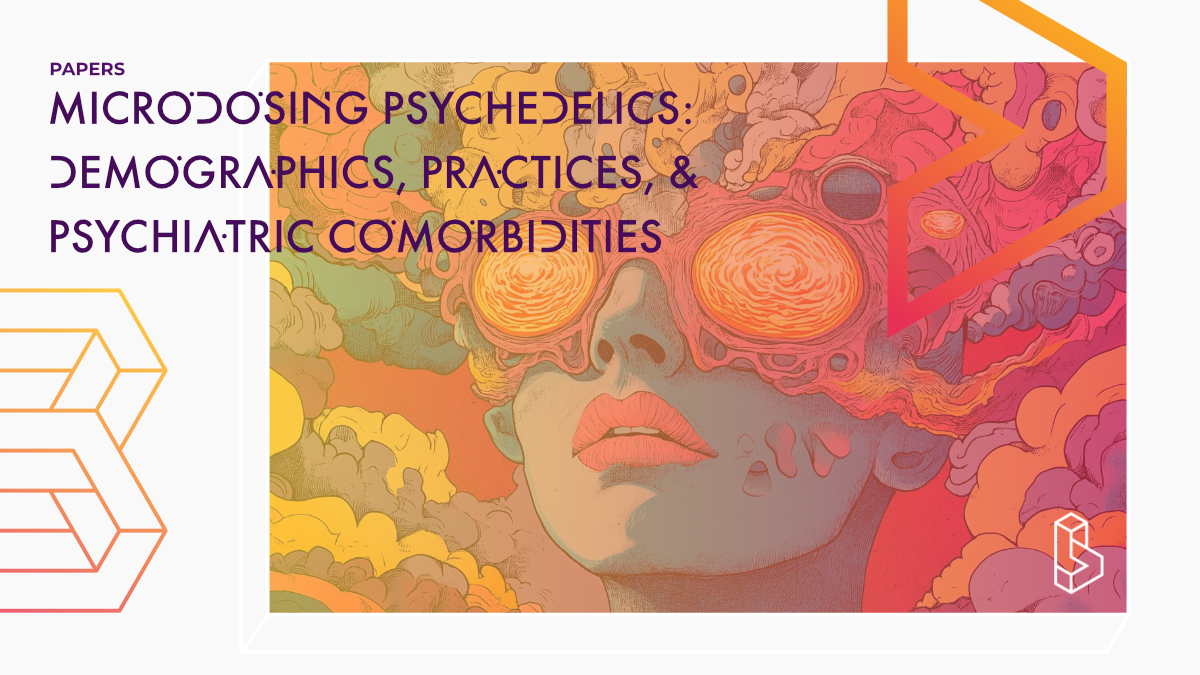This survey (n=909) of psychedelic microdosers found that they were more likely than the general public to have used substances recreationally and were less likely to suffer from substance use disorder (SUD) or anxiety disorder. Most microdosed with either LSD (13μg) or psilocybin (0.3g mushroom).
Abstract of Microdosing psychedelics: Demographics, practices, and psychiatric comorbidities
“Rationale: Microdosing psychedelics – the practice of consuming small, sub-hallucinogenic doses of substances such as LSD or psilocybin – is gaining attention in popular media but remains poorly characterized. Contemporary studies of psychedelic microdosing have yet to report the basic psychiatric descriptors of psychedelic microdosers.
Objectives: To examine the practices and demographics of a population of psychedelic microdosers – including their psychiatric diagnoses, prescription medications, and recreational substance use patterns – to develop a foundation on which to conduct future clinical research.
Methods: Participants (n = 909; Mage = 26.9, SD = 8.6; male = 83.2%; White/European = 79.1%) recruited primarily from the online forum Reddit completed an anonymous online survey. Respondents who reported using LSD, psilocybin, or both for microdosing were grouped and compared with non-microdosing respondents using exploratory odds ratio testing on demographic variables, rates of psychiatric diagnoses, and past-year recreational substance use.
Results: Of microdosers, most reported using LSD (59.3%; Mdose = 13 mcg, or 11.3% of one tab) or psilocybin (25.9%; Mdose = 0.3 g of dried psilocybin mushrooms) on a one-day-on, two-days-off schedule. Compared with non-microdosers, microdosers were significantly less likely to report a history of substance use disorders (SUDs; OR = 0.17 (95% CI: 0.05–0.56)) or anxiety disorders (OR = 0.61 (95% CI: 0.41–0.91)). Microdosers were also more likely to report recent recreational substance use compared with non-microdosers (OR = 5.2 (95% CI: 2.7–10.8)).
Conclusions: Well-designed randomized controlled trials are needed to evaluate the safety and tolerability of this practice in clinical populations and to test claims about potential benefits.“
Authors: Daniel Rosenbaum, Cory Weissman, Thomas Anderson, Rotem Petranker, Le-Anh Dinh-Williams, Katrina Hui & Emma Hapke
Summary of Microdosing psychedelics: Demographics, practices, and psychiatric comorbidities
Rosenbaum and colleagues begin by introducing the concept of microdosing, which refers to the use of low, typically sub-perceptual doses of pharmacological substances. In the context of classic psychedelic drugs like lysergic acid diethylamide (LSD) and psilocybin, microdosing involves ingesting approximately 1/10th of what would be considered a standard psychoactive dose. The authors note that classic psychedelics are compounds that share 5-HT2A receptor agonist properties and, at higher doses, induce profound alterations in thought, perception, and emotion.
The researchers highlight that while various studies have demonstrated the safety and low addiction potential of psychedelics in healthy and clinical populations, there remains a dearth of academic research describing the practice of microdosing. They point out that few scientific articles on microdosing among human subjects have been published, including two by their own group. The authors emphasise that contemporary studies of psychedelic microdosing have yet to report the basic psychiatric descriptors of psychedelic microdosers.
The primary aim of this study is to describe the demographics, practices, and basic psychiatric descriptors of a large group of English-speaking adult microdosers. This report is part of a broader examination of survey response data that included testing of pre-registered hypotheses about microdosing and personality variables, which showed that current and former microdosers scored lower on measures of dysfunctional attitudes and negative emotionality and higher on wisdom, open-mindedness, and creativity when compared with non-microdosing respondents.
Methods
Participants
Find this paper
Microdosing psychedelics: Demographics, practices, and psychiatric comorbidities
https://doi.org/10.1177%2F0269881120908004
Open Access | Google Scholar | Backup | 🕊
Cite this paper (APA)
Rosenbaum, D., Weissman, C., Anderson, T., Petranker, R., Dinh-Williams, L. A., Hui, K., & Hapke, E. (2020). Microdosing psychedelics: Demographics, practices, and psychiatric comorbidities. Journal of Psychopharmacology, 34(6), 612-622.
Study details
Compounds studied
Psilocybin
LSD
Topics studied
Microdosing
Study characteristics
Survey
Participants
909
Humans

